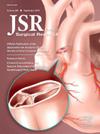Bridging the Gap: Improving Data Sharing Practices in Surgical Research
IF 1.7
3区 医学
Q2 SURGERY
引用次数: 0
Abstract
Introduction
Data sharing is critical for improving patient outcomes and ensuring research transparency. However, adherence to the International Committee of Medical Journal Editors guidelines requiring data-sharing statements (DSS) in clinical trials remains inconsistent within surgical research.
Methods
A systematic review and cross-sectional analysis of 1094 articles from the top h-5 indexed surgery journals (2020-2023) was conducted. Articles were screened based on predefined criteria. Hierarchical logistic regression identified factors influencing DSS inclusion, and thematic analysis examined DSS content.
Results
Of the 1094 articles, only 141 (12.89%) included DSS, with higher rates in clinical trials (18.05%) compared to cohort studies (5.20%). Studies funded by government or industry and open-access articles (18.95%) were more likely to include DSS. Journals with higher impact factors were more likely to comply. Thematic analysis revealed recurring issues of gatekeeping, conditional data access, and privacy concerns. Out of 96 corresponding authors contacted, only 18 shared data.
Conclusions
Data-sharing rates in surgical journals remain low, especially in non–open-access and unfunded studies. Strengthened policies are essential to improve transparency and reproducibility in surgical research.
弥合差距:改进外科研究中的数据共享实践
数据共享对于改善患者预后和确保研究透明度至关重要。然而,在外科研究中,对临床试验中数据共享声明(DSS)要求的国际医学杂志编辑委员会指南的遵守仍然不一致。方法对2020-2023年美国h-5期刊收录的1094篇文献进行系统回顾和横断面分析。文章是根据预定义的标准筛选的。层次逻辑回归确定了影响决策支持的因素,主题分析检验了决策支持的内容。结果1094篇文献中,仅有141篇(12.89%)纳入DSS,其中临床研究(18.05%)高于队列研究(5.20%)。由政府或行业资助的研究和开放获取文章(18.95%)更有可能包含DSS。影响因子较高的期刊更有可能遵守。专题分析揭示了守门人、有条件的数据访问和隐私问题等反复出现的问题。在我们联系的96位通讯作者中,只有18位分享了数据。结论外科期刊的数据共享率仍然很低,特别是在非开放获取和未资助的研究中。加强政策对于提高外科研究的透明度和可重复性至关重要。
本文章由计算机程序翻译,如有差异,请以英文原文为准。
求助全文
约1分钟内获得全文
求助全文
来源期刊
CiteScore
3.90
自引率
4.50%
发文量
627
审稿时长
138 days
期刊介绍:
The Journal of Surgical Research: Clinical and Laboratory Investigation publishes original articles concerned with clinical and laboratory investigations relevant to surgical practice and teaching. The journal emphasizes reports of clinical investigations or fundamental research bearing directly on surgical management that will be of general interest to a broad range of surgeons and surgical researchers. The articles presented need not have been the products of surgeons or of surgical laboratories.
The Journal of Surgical Research also features review articles and special articles relating to educational, research, or social issues of interest to the academic surgical community.

 求助内容:
求助内容: 应助结果提醒方式:
应助结果提醒方式:


